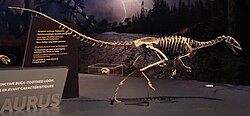Noasauridae
| Noasaurids Temporal range: Late Jurassic - Late Cretaceous, 161–69 Ma |
|
|---|---|
 |
|
| Reconstructed skeleton of Masiakasaurus knopfleri, Royal Ontario Museum | |
| Scientific classification | |
| Kingdom: | Animalia |
| Phylum: | Chordata |
| Class: | Reptilia |
| Clade: | Dinosauria |
| Order: | Saurischia |
| Suborder: | Theropoda |
| Clade: | †Abelisauria |
| Family: |
†Noasauridae Bonaparte & Powell, 1980 |
| Genera | |
|
|
| Synonyms | |
|
Velocisauridae Bonaparte, 1991 |
|
Velocisauridae Bonaparte, 1991
Noasaurids were a group of theropod dinosaurs from the Cretaceous Period (Aptian/Albian-Maastrichtian ages). They were generally small in size. They were closely related to and built similarly to the Abelisauridae. The best known noasaurid is Masiakasaurus knopfleri from Madagascar.
Noasauridae is defined as all theropods closer to Noasaurus than to Carnotaurus. Many species have been referred to Noasauridae, though most are known from extremely fragmentary remains, which makes it difficult to assess their relationships.
The following cladogram is based on the phylogenetic analysis conducted by Rauhut and Carrano in 2016, showing the relationships among the Noasauridae:
An analysis conducted by Tortosa et al., 2013., 2013 recovered Dahalokely as a basal noasaurid. However, later analyses have found it to be a basal carnotaurine instead. Similarly, the genus Genusaurus has been found to be a noasaurid by some older studies, but more recently has been classified as an abelisaurid.
...
Wikipedia
